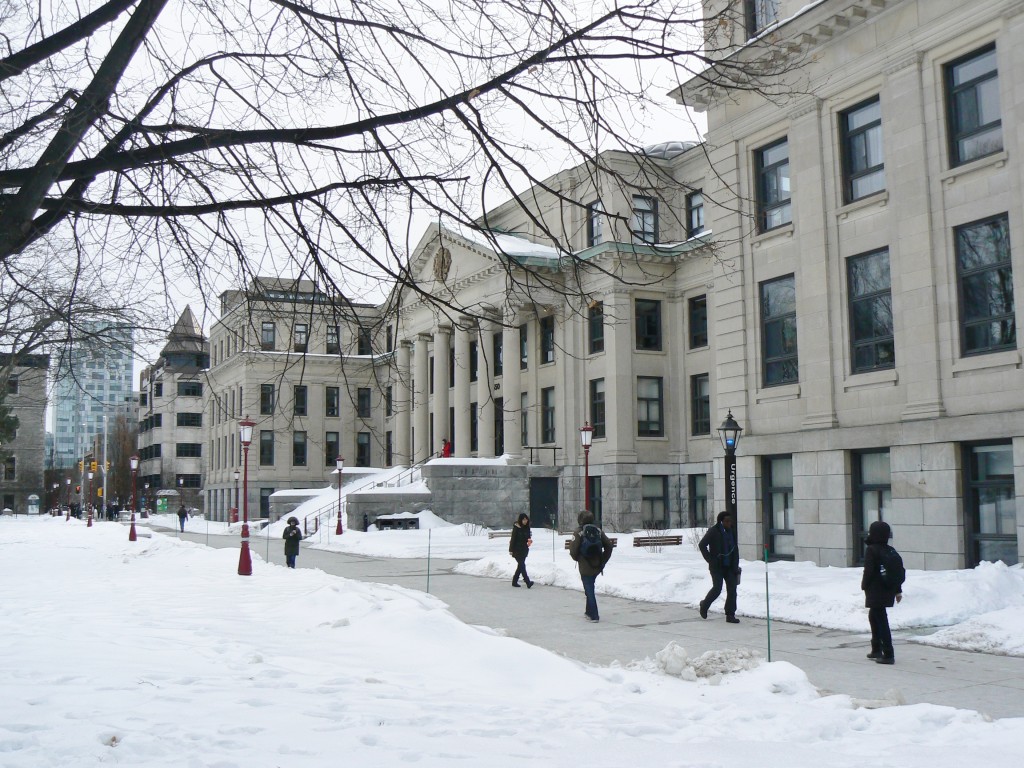Ontario budget: free tuition, transit funding, and plenty of controversy
It’s budget season in Canada. Provincial governments have been announcing their spending estimates for the next fiscal year. On February 25, it was Ontario’s turn when Finance Minister Charles Sousa made his budget speech at the legislature in Toronto. It’s been a few weeks since Governor Andrew Cuomo’s administration in Albany unveiled its spending plans but the issues in Ontario are similar, both in the fiscal and political sense. There are winners, losers, people who like the plan, and those who blatantly hate it.
Premier Kathleen Wynne’s Liberal government is projecting a budget deficit of $4.3 billion (Canadian) for the year ahead, half a billion less than originally anticipated. The deficit for the past year was $5.7 billion, $2.8 billion less than the year before. The Liberals plan to have the books balanced next year.

Tabaret Hall at the University of Ottawa. The recent Ontario budget means students from households with an income under $50,000 will basically study tuition-free.
Government budgets in Canada are often seen by both politicians and the public as a sort of annual offering of what they can expect to get, or not to get from the government in the year ahead. One feature is environment-related. Ontario is implementing a carbon cap and trade system. Last year, Premier Wynne announced the province would join a carbon exchange arrangement that Quebec and California are part of. The government claims that the plan will add 4.3 cents per liter to the price of gasoline. Premier Wynne has stated that the extra cost is less than the cost of doing nothing about greenhouse gas emissions.
Anyone seeking post-secondary education in Ontario is the big winner in this budget. Under a new grant program, undergraduate or community college tuition will be basically free for any student from a family with a yearly income of $50,000 or less. Grants will also ease the tuition burden for students from higher income households. It’s a move right out of the playbook of progressives like Bernie Sanders who want to make all college education tuition-free.
The other major plan is to introduce an Ontario Retirement Pension Plan (ORPP) that would supplement the federally-administrated Canada Pension Plan (CPP). However, this plan could be shelved if the Ontario government’s Liberal friends under Justin Trudeau in Ottawa decide to make changes to the CPP. Critics call the plan nothing but a “payroll tax” because it would lead to more deductions from workers’ checks.
Public transit is a big benefactor of the budget too. However, most public transit systems in Ontario that need expansion are located in the Toronto or Ottawa area. The budget does include a promise of funding for phase two of the Ottawa Light Rail Transit (LRT) project, but with no specific dollar amount. Money has also been promised for further widening along Highway 417 through the city, according to Yasir Naqvi, a Liberal who represents Ottawa Centre in the legislature.

BIG DIG: Tunnel construction site for Ottawa’s new LRT project. The recent Ontario budget promises funding for its second phase.
The official opposition Progressive Conservatives (PC) are not impressed with the budget. Their reaction has been high on rhetoric, accusing the government of “reckless spending” and accusing the Liberals of raising taxes by $3 billion in order to balance the budget and pay for scandals that have developed during their 13 years in office. It is indeed true that the Liberal government has faced its share of scandals too, notably over the cost of suddenly canceling two new power stations that were supposed to be built in districts where the party was threatened with losing in the 2011 election. More recently, a scandal has erupted over the Liberal party allegedly bribing a candidate not to run in a special election in the northern city of Sudbury so the Premier’s preferred candidate could run instead. And of course, state politics in New York have faced more than a couple major scandals in the past year too.
PC Party Leader Patrick Brown questions the credibility of the Liberal budget numbers and says the PC’s have better plans. Lisa MacLeod, a PC legislator from the Ottawa area, accuses the Liberals of introducing the budget without using the input gathered through the legislative committee that examines economic issues. PC Steve Clark, who represents Brockville and Leeds-Grenville says the budget will make power, gasoline, and prescription drugs for senior citizens more expensive than they already are due to the cap and trade program and changes to the drug insurance program. However, there’s inconsistency in the PC response. Their sharp criticisms of excessive spending do not agree with their similar criticisms on insufficient spending.
The Progressive Conservatives seem to be in soul-searching mode when it comes to their message. They governed Ontario from 1943 to 1985 and were often to the left of the Liberals, especially under Premiers John Robarts and William G. Davis, whose policies bore more resemblance to New York under Nelson Rockefeller than Wisconsin under Scott Walker. The PC’s took a sharp right turn after returning to power under Premier Mike Harris from 1995 to 2003, cutting, or even undoing many things they had accomplished in their heyday. They’ve gone through two leaders since then and are now led by Patrick Brown. The Ontario PC’s are actually holding their annual policy and executive convention this weekend at the Shaw Centre in Ottawa. The social democratic New Democratic Party (NDP) seems to be similarly finding itself. It entered the 2014 election campaign with high hopes that quickly faltered. The two opposition parties and Ontario residents, whether they like it or not, have to wait and live with the Liberals until the 2018 election. Meanwhile, Prime Minister Justin Trudeau’s federal Liberal government in Ottawa will introduce its first budget on March 29.
Tags: budget, canada, education, environment, NY, Ontario, politics, scandals







